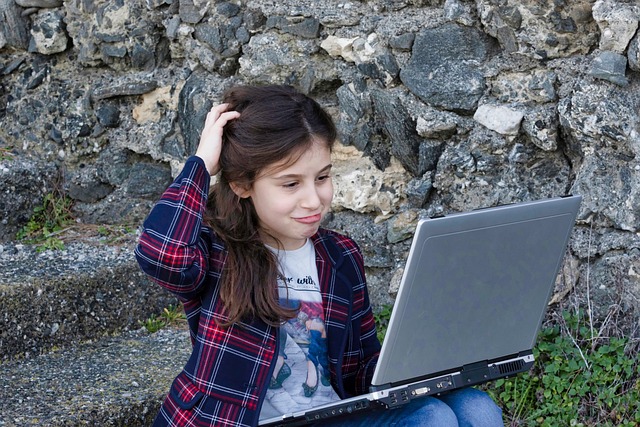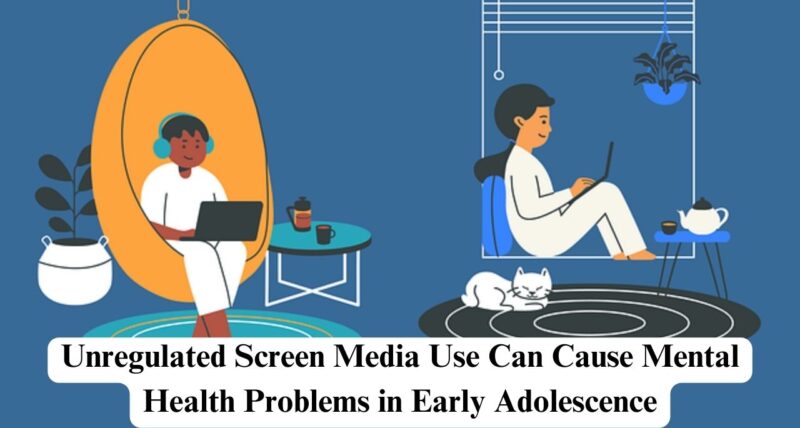The modern world is all about screens and people being virtually connected always! Time spent on online classes, gaming, social media, and TV programs has substantially increased among children. Reportedly, it has risen to 7.7 hours per day from the record of 3.8 hours before COVID-19. However, the rise of rule-breaking behaviors, depression, and anxiety has – made it important for researchers to find the relationship between unregulated screen media use and mental health problems in early adolescence.
A team of researchers used a sample from the Adolescent Brain and Cognitive Development study to elaborate on the longitudinal associations between particular types of screen media use, different mental health problems, and brain development.
The results highlighted how different screen media use has associations with mental health problems – cortical–subcortical connectivity and subcortical volume in children. According to the study – an increase in rule-breaking behavior was related to passive media use, and increased withdrawal/depression symptoms resulted from spending more time in video games. In addition, a reduced volume of the caudate, hippocampus, and thalamus proper was related to more social media use by a child while growing up.
How To Guide Your Child?
With screens everywhere, monitoring your child’s screen time can be challenging! However, the rise in screen media use and mental health problems make it mandatory for parents to take action immediately. Here is a list of mitigation strategies that you can try to introduce to your child’s daily routine, making them take up healthy habits for the long run.

Come Up With Screen Time Rules
According to the American Academy of Pediatrics, children under eighteen months should not be exposed to media screens except for video chatting when required. Parents introducing screen media to their children between eighteen and twenty-four must ensure the video is high-quality and the child is not alone while watching it.
Parents must use efficient screen controls and parental locks to filter or block certain internet content as the child grows. It’s important for working parents to preview programs for children, even educational games, before introducing them to their children. After your daily work, keep aside some time for your child and ask them what they have watched throughout the day. Make the conversation organic and focus on the details to understand what type of media they are exposed to while you are away.
Encourage Digital Literacy
While growing up, at some point, your child will come across content you have not approved, and there will be devices without internet filters. Discuss with your child about such situations and the behavior you expect from them. Encourage critical thinking in your child. Due to the rise in screen media use and mental health problems, talking to them about scenarios and sharing your experience with digital media is important. Ask your child to cross-question everything and evaluate facts before believing that what is shown on the internet is accurate.
Understand if your adolescent kid knows how to find out if a site is trustworthy. Help your child understand that people publish and stream content on media with their own point of view. Explain that many technology-based unscrupulous methods are available to collect data without the person knowing. These people later use the collected information to make money by selling them to third parties. Let your child know how to avoid credit card fraud and websites asking for biometric verification for game downloads or video viewing.
Plan An Active Screen Time
Get your child to stretch or do yoga poses while watching a show. Plan active Sundays, where the entire family will indulge in active workout sessions while watching TV. You can choose video game sessions with your kids, but set challenging goals. Also, apply the same on your own and participate in physical activities with your child.
Always talk to your child about new yoga poses, introduce them to the gym, and make sure they are not lifting heavy weights but taking part in strength training in the beginning. In the evening, rather than letting your child sit idle with their electronic devices, you can take them to the nearby park and walk together. The idea is to make them understand the difference between the reel world and the real world. For your own ‘me time,’ do not let your child get addicted to the fantasy world of mobiles and video games.

Set Up Limits For Older Children
As your child grows up, they start to have a separate world. It’s a whole lot of new things that they come across every day! And frankly, adolescence can be a difficult stage. With so many hormonal changes, new rules, friends coming close and moving apart. You need to put yourself in your child’s place, understand how the curious mind thinks of everything, and how you used to behave at the same age.
But in the meantime, do not forget you are now a parent! And also consider the reported relationship between screen media use and mental health problems. So, come up with clear, non-negotiable rules – setting limits to your child’s digital media usage. Encourage them to unplug and spend a certain time of the day, every day, amongst nature. Also, you must practice the same with them. Create tech-free zones in your house. For example, the – prayer area, terrace, dining table, and washrooms.
Remember, as a parent, it’s important to ensure your child gets the best of everything! And owing to the cases of screen media use and mental health problems, taking action is even more important. So, from now on, always take action and let digital media not ruin the future of your precious born under any circumstances.



